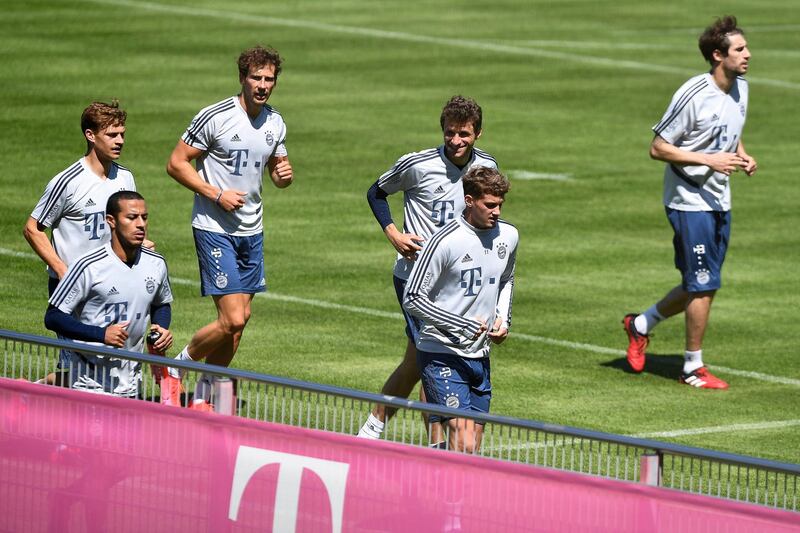Elite European football will return to stadiums within as little as ten days after the German government gave a green light to the Bundesliga to resume.
The decision is a watershed moment, a signal that, while the global battle against coronavirus continues, major competitive sport has a place.
There are strict conditions to the Bundesliga restart. The 36 clubs who make up the top two divisions of German professional football will play in front of empty seats, with supporters barred from entering stadiums.
Players, coaches and support staff will observe a form of isolation ahead of, and during, the six to seven weeks now allocated to complete the outstanding fixtures in the 2019-20 league season, to protect against the risk of spreading infection.
Football, a contact sport, can never adhere to any ‘social distancing’ rules over its 90 minutes of tackling and duelling, and so its German professionals will need, once they have each been passed negative for Covid-19 via regular tests, to be shielded from the rest of society.
Fans will watch the Bundesliga restart only on television, and the subscription channels that hold the rights to broadcast the Germany league have been firmly guided by government to make a portion of their matches available to non-subscribers to compensate for the fact that games will take place behind-closed-doors.
An exact date for the restart has yet to be set, and there is already disagreement between clubs over whether the weekend beginning May 15 or, rather, May 22 is the best date to reopen a season that was suspended in mid-March, when Europe began to lockdown, realising the scale of the pandemic.
Some coaches want more time to prepare players; some want to get back into action as quickly as possible.
But the overwhelming sentiment on Wednesday, when German Chancellor Angela Merkel chaired a video-conference of the country’s 16 regional premiers and the return of professional football was among a number of measures agreed to ease the country’s lockdown, was of relief.
"As a society, we are still in a tough place in the fight against this pandemic,” said Horst Heldt, general manager of top-flight Cologne, “but for all of us it is a joy that we are able to play football again.”
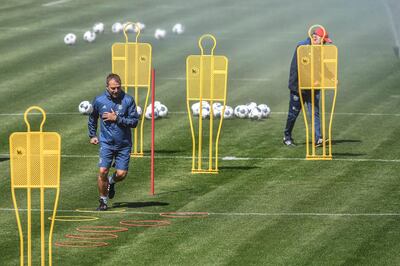
The political backing is powerful. “The decision on the Bundesliga was unanimous,” the mayor of Hamburg, Peter Tschentscher, flanking Chancellor Merkel, announced.
The economic implications are considerable. Clubs from the top two divisions were facing losses of hundreds of millions of euros in broadcast revenues alone if the current season had been abandoned, as the league in neighbouring France was last week.
Empty stadiums will mean lower match day income, but clubs hope that a start date within the next two weeks means another financial headache can be soothed.
With nine match days left to play, and a schedule of weekend and midweek fixtures, the league season should be completed by the end of June.
Footballers in the final year of their contracts are, in theory, released on June 30, and complications were anticipated if out-of-contract players were asked to play beyond that date.
Crucial to the German government’s approval were the guidelines drawn up by a special medical task force, commissioned by the DFL. Their advice is that, provided clubs maintain an effective shield around the players, coaches and technical staff, the risk of increasing national infection rates is low.
Clubs will effectively quarantine their squads - who have been training in small groups since early April, with very limited one-on-one contact - between now and the end of the season. “The lead-up to the restart must involve a degree of quarantining, like a training camp,” the task force recommends.
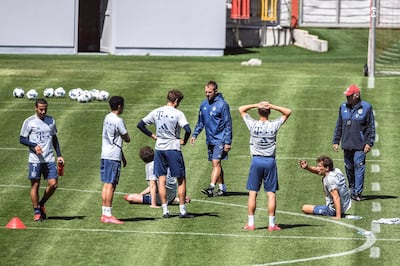
Results from the latest round of extensive testing of players and staff for Covid-19 were also key to government approval for full training and matches.
The 36 clubs reported a total of ten positive tests from more than 1700 tests - the ten are believed to be asymptomatic - and while those who tested positive have been isolated from their colleagues, the task force guidelines recommended no need to isolate any players or staff that infected individuals may have been working with.
A week ago, Merkel’s government delayed a decision on restarting the Bundesliga, and the possibility of the go-ahead had been cast into further doubt when a Cologne player, Birger Verstraete publicly expressed concerns that three Cologne employees had tested positive, potentially putting teammates and their families at risk.
On Monday video footage of the Hertha Berlin striker Salomon Kalou failing to observe physical distancing rules in the dressing-room emerged. Verstraete later softened his criticisms while Kalou, who has been suspended by Hertha, apologised.
“I would appeal to everybody to follow the guidelines in an exemplary and an extremely disciplined way,” said Karl-Heinz Rummenigge, the executive president of Bayern Munich, in a veiled reference to the Kalou incident. “The guidelines are the reason we can get going again.”
Rummenigge’s Bayern are in favour of a May 15 or 16 resumption. But other clubs want a longer lead-in. “It will take time to get used to competitive football again, after a break of two months and restricted training,” said Frank Baumann, general manager of Werder Bremen.
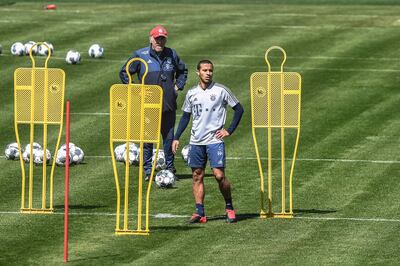
“We have only been able to train in groups of four players at a time up until now [because of regional restrictions, stricter in Bremen than some other areas] and to start before May 22 or 23 would be a real disadvantage for us.”
Clubs will meet on Thursday to agree on the restart dates, while negotiations are already under way about revising the broadcasting conditions of matches.
The rights-holders for Bundesliga games are both subscription channels, Sky and DAZN, but they are under strong political pressure to show matches free-to-air given there will be no spectators in the stadiums.
There is also a public health argument for making matches available more widely, because authorities fear large numbers of fans might otherwise gather at the homes of Sky or DAZN subscribers to watch, infringing social distancing rules and risking contagion.
What the DFL and the German government know for sure is that the return to action will be widely watched from abroad.
As the first of the major European leagues to restart, the Bundesliga provides a potential route map for safe sport everywhere.
The English Premier League, Spain’s La Liga and Italy’s Serie A will study the conditions under which it has been deemed viable, although they acknowledge it will be several weeks yet before they can follow. The public health emergency in those countries is far graver than in Germany.
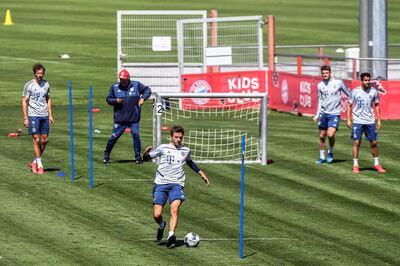
Britain, Italy and Spain, with populations far smaller than Germany’s, have each reported more than 25,000 Covid-19 fatalities so far. In France, where the disease has claimed more than 25,000 lives, the remainder of the domestic football season was cancelled when the French government banned all team sport until at least September.
The ambition for the football authorities in Spain and England is to have top-flight matches, behind-closed-doors, under way in June, while Uefa, who postponed this summer’s European Championship so domestic seasons could be completed, hope to play out the remainder of the Champions League and Europa League in August.
Should the Bundesliga finish, as planned, by July, that would leave Bayern Munich, and RB Leipzig, the two German clubs still in the Champions League, with five or six weeks to prepare for their European challenge.
By then, one of them may well be crowned Bundesliga champions.
When the league does resume, a gripping title-race is in prospect, with the top four - leaders Bayern, Borussia Dortmund, Leipzig and Borussia Monchengladbach - separated by just six points.
Empty stadiums or not, there is plenty worth watching in Germany for a global audience longing for high-quality football.
